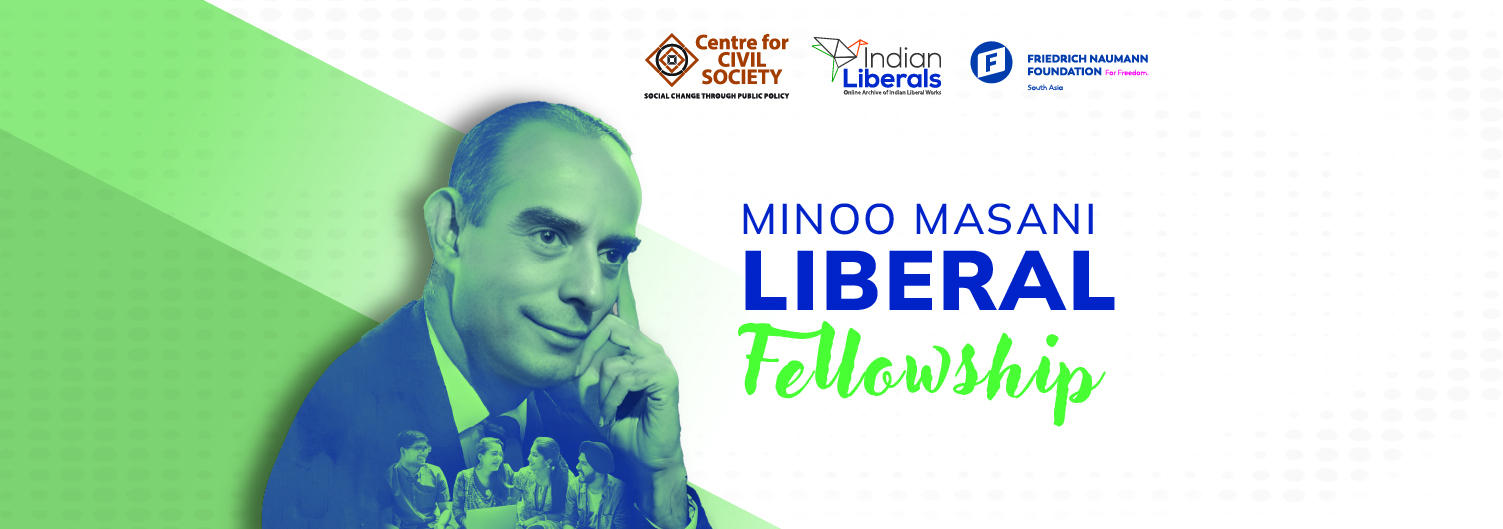
Background:
Centre for Civil Society, a public policy think tank based in New Delhi, is inviting applications for the Minoo Masani Liberal Fellowship under the Indian Liberals project. Indian Liberals is an initiative of the Centre for Civil Society supported by the Friedrich Naumann Foundation South Asia. It is an online archive of Indian Liberal works intending to collate, preserve and promote the research and study of liberalism in India.
About Minoo R Masani:
Minocher Rustom Masani was born on 20 November 1905 in Bombay. Young Masani was an admirer of the communist experiment. In 1934, the Bombay branch of the Congress Socialist Party (CSP) was set up under him. A year later, he revisited the Soviet Union to explore the possibility of an alliance with the Soviet communists. By 1938, however, Masani was growing disenchanted with communism. He had become very critical of Stalinist purges and urged his fellow socialists to oppose them. The attempted takeover of CSP by the communists also made him wary of the ideology.
Masani’s combat against the increased influence of communism became a feature of his public career in independent India. The Nagpur Resolution of Congress, which advocated cooperative farming, brought Rajaji and Masani together to form Swatantra Party in 1959 as a coalition of pro-market business people, peasant proprietors, beleaguered princes, and zamindars. Swatantra emerged as the largest opposition party in the fourth Lok Sabha (1967-1971) with 44 seats.
He fought against the press censorship imposed during the Emergency. Project for Economic Education and Leslie Sawhny Programme of Training for Democracy was his brainchild for creating a liberal discourse in India. Masani was a fierce defender of free choice in a society governed by right-wing social conservatives and left-wing statist economics. He was also a powerful supporter of personal liberty and strongly advocated for the Medical Termination of Pregnancy Act of 1971, which legalised abortion in India.
Why Minoo Masani Liberal Fellowship?
Indian Liberals provides a platform to exchange, deliberate and spread the ideas of classical liberalism across one’s circle of influence. While Liberalism as a school of thought has evolved through the years, its focus on individual development and freedom of choice has remained consistent. Minoo Masani Liberal Fellowship is an opportunity for young leaders passionate about carrying these ideas in their own words and working towards preserving India’s history with Liberalism.
We hope to collaborate with Graduates from any of the Liberal Arts, Media, Public Policy or Law backgrounds with an excellent academic record from a leading university. Proficiency in Indian Languages such as Hindi/ Bengali/ Marathi or Telugu is preferable to research into regional literature on Liberalism in India.
Responsibilities of the fellow:
Minoo Masani Liberal Fellows will contribute in the form of well-researched articles on the Indian Liberal tradition, work on sourcing archival content for the website, and work under the supervision of the Project Lead for deliverables of the Project.
Through the course of this Fellowship, the selected candidates will be expected to:
- Commit 20 hours per week (Mon-Fri)
- Research and source information on Indian liberal thinkers.
- Develop a database of 12 Indian Liberal works for the website.
- Publish six well-researched essays (2 per month) on the Indian Liberal Tradition.
Duration:
The Fellowship will start from 26th June 2023 and will end on 30th September 2023. The contract may be renewed on a need basis.
Application Process:
The last date for applications is 11th June 2023, 11:59 PM IST. An online/in-person interview will be conducted for shortlisted candidates.
Remuneration:
A monthly stipend of INR 10,000/- will be paid.
Eligibility:
- Bachelor’s degree (or above) in any of the Liberal Arts, Media, Public Policy or Law Courses with a strong educational background from a leading university. A master's or graduate degree is preferred.
- Demonstrated interest in or understanding of classical liberal principles and concepts preferred.
- A keen interest in the history of the liberal tradition in India.
- Interest and knowledge in liberal feminism subject are preferable.
- Excellent communication skills in English and ability to create original content.
- Proficiency in reading, writing and communicating in Telugu/Marathi/Hindi or Bengali is preferable.